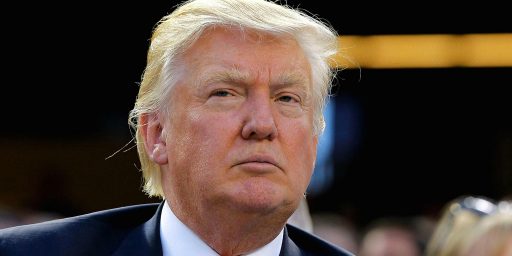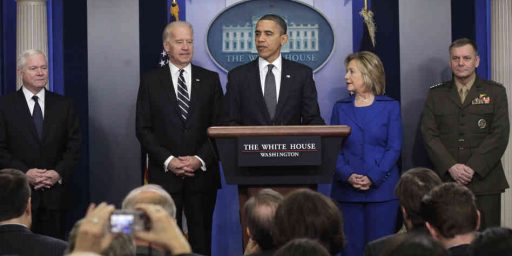Pentagon Tightens Media Access Rules
It's going to be much harder for reporters to get access to the military thanks to new rules announced last night by the Pentagon.
In what seems to be a reaction to the Rolling Stone interview of General Stanley McChrystal, the Pentagon is tightening the rules governing press access to the military:
WASHINGTON — Nine days after a four-star general was relieved of command for comments made to Rolling Stone magazine, Defense Secretary Robert M. Gates issued orders on Friday tightening the reins on officials dealing with the news media.
The memorandum requires top-level Pentagon and military leaders to notify the office of the Defense Department’s assistant secretary for public affairs “prior to interviews or any other means of media and public engagement with possible national or international implications.”
Just as the removal of Gen. Stanley A. McChrystal from command in Afghanistan was viewed as President Obama’s reassertion of civilian control of the military, so Mr. Gates’s memo on “Interaction With the Media” was viewed as a reassertion by civilian public affairs specialists of control over the military’s contacts with the news media.
Senior officials involved in preparing the three-page memo said work on it had begun well before the uproar that followed Rolling Stone’s profile of General McChrystal. But they acknowledged that the controversy, and the firing of one of the military’s most influential commanders, served to emphasize Mr. Gates’s determination to add more discipline to the Defense Department’s interactions with the media.
“I have said many times that we must strive to be as open, accessible and transparent as possible,” Mr. Gates wrote in the memo, which was sent to senior Pentagon civilian officials, the nation’s top military officer, each of the armed-services secretaries and the commanders of the regional war-fighting headquarters. “At the same time, I am concerned that the department has grown lax in how we engage with the media, often in contravention of established rules and procedures.”
The memo by Mr. Gates, a former C.I.A. director, also demanded greater adherence to secrecy standards, issuing a stern warning against the release of classified information: “Leaking of classified information is against the law, cannot be tolerated and will, when proven, lead to the prosecution of those found to be engaged in such activity.”
(…)
Mr. Gates’s memo “is based primarily on his view that we owe the media and we owe ourselves engagement by those who have full knowledge of the situations at hand,” Mr. Wilson said.
Mr. Gates was particularly concerned that civilian and military officials speaking to reporters sometimes had only a parochial view of a national security issue under discussion. The new orders, Mr. Wilson said, were devised to “make sure that anybody and everybody who does engage has as full a picture as possible and the most complete information possible.”
The repercussions of the Rolling Stone profile have included heightened concerns that military officers will become warier of the press — and it is expected that many officers will read the new memo as an official warning to restrict access to reporters.
If that happens, it would be unfortunate.
While there is a definite need for the military to be able to do it’s work with sufficient secrecy that the safety of troops and the success of operations isn’t compromised, there should be a default position that allowing reporters to have access to the troops is in the interests of both the military itself and the public that they are sworn to defend. Of course, this requires some responsibility on the part of journalists to be careful about what they report.
Additionally, ever since Vietnam it’s fairly clear that there is some hostility between the military and the press. We’re never going to return to the days of World War II, where reporters like Ernie Pyle were as much cheerleaders for the American war effort as they were objective journalists. The style of journalism that exists today is, by default, much more skeptical of authority, especially military authority, than what exists sixty years ago, and that is likely responsible for at least part of the rift that has developed over the years.
The fact that a rift exists, though, is probably a good thing. Just as it was not in the interests of American voters to have a White House Press Corps that willingly choose to suppress information about Presidents like FDR and Kennedy, it isn’t in their interests to be kept in the dark about what is actually being done in their name in foreign lands. If that means that the public itself becomes more skeptical of the use of military force, then so be it.
On a final note, one has to wonder just how effective these rules are going to be when you read something like this:
A copy of the unclassified memo by Mr. Gates was provided to The New York Times by an official who was not authorized to release it. Douglas B. Wilson, the new assistant secretary of defense for public affairs, and Geoff Morrell, the Pentagon press secretary, verified its content.
Information is going to get it out, it seems, regardless of what rules are in place.





